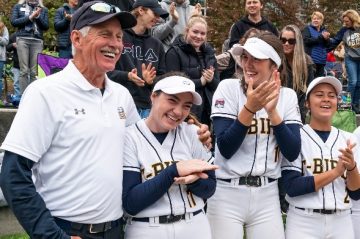Biography
Gord Collings has received three degrees from UBC: B.Sc. 1975, B.Ed. 1976 and M.Ed. (Counselling Psychology) 1985. He was a teacher, counsellor and administrator in the Delta School District for over 34 years and is currently in his ninth year as the Head Coach of the UBC Softball Team.
Gord began his career in education in 1976 and spent eight years at Delta Secondary School before returning to UBC to complete his M.Ed. He returned to Seaquam Secondary School in 1985 as a counsellor and became the Vice-Principal of Delview Junior Secondary School in 1989. In 1994 he was promoted to Principal and served at Sands Junior Secondary (1994-1999), South Delta Secondary School (1999-2006) and Seaquam (2006-2010) until his retirement in January 2010. He was a Certified Instructor for the Crisis Prevention Institute and gave workshops on school safety and classroom management for a number of school districts, the BCPVPA and the Justice Institute. He served on the Association of Delta’s School Administrators, was the district representative for the BCPVPA and the provincial Safe Schools Committee.
Gord has coached softball for over 25 years, both in the community and at the university level. He founded the softball program at Douglas College in 2009 and became the Head Coach at UBC in 2013. In addition to his coaching responsibilities at UBC, Gord serves on the UBC Athletics and Recreation Department Steering Committee on Equity, Diversity and Inclusion and has developed and presented team awareness and staff professional development activities focussing on anti-racism. He is a member of Softball Canada’s Coaching Development Committee and in addition to helping rewrite NCCP softball coaching requirements has helped develop standards that raise awareness and educate coaches to recognize and prevent bullying, abuse, harassment and discrimination in sport.
Meeting Gord
What is your most memorable experience from your time in the Faculty of Education?
I have many fond memories of my time in the Faculty of Education: particularly the friendships we developed within our cohort groups, the support from our advisors and school sponsors, and the experiences and passion we shared in our group discussions after each practicum.
I still vividly remember the anxious moments leading up to my first day of teaching as a student teacher and how my school sponsor teacher Mr. Foreman was so encouraging and supportive. He was very influential throughout my practicum and I am grateful for his guidance and mentorship as I launched my career in education.
Where has your education from the Faculty of Education taken you in your career?
The education I received from both my Faculty of Education degrees provided the foundational training for me to become a teacher, counsellor and administrator. I am proud of the contributions I made to the Delta School District, to the education and welfare of my students and the leadership and support I provided for the staff at each of my schools. Throughout my teaching, administrative and coaching career, I have had the opportunity to work with and influence students, staff, athletes and families from a diverse range of ethnic backgrounds and always did my best to address and respect their needs.
As a varsity athletic coach, I have been able to utilize my M.Ed. in counselling psychology to support my student-athletes by helping them recognize and address issues related to their mental health as well as in the development of team and personal mental training plans.
Where do issues of inclusion find a place in your life or at work?
In my educational roles, addressing issues of inclusion, equity and diversity occurred on a daily basis. I was fortunate to work in a progressive school district where I participated in and helped develop school-based initiatives and district programs to address inclusion and equity in the classroom and in the community.
As a varsity coach of student-athletes I have introduced educational activities to help my players become more aware of, and better recognize explicit and implicit racial bias in sport. In addition, by using the UBC Inclusion Action Plan as a guide, our team has raised awareness and explored actions that have enhanced a team culture where athletes, coaches and support staff welcome those who may have been or are systemically marginalized and “ensure they are treated equitably, feel respected, and belong.”
Do you have any words of wisdom for current students? Newly graduated folks?
I believe we all have a moral and ethical responsibility to be consciously aware of social injustices in society and to contribute to initiatives and activities that aim to minimize and eliminate racism and discrimination.
Teachers can be very influential in a young person’s life – never underestimate the impact your words and actions can have on a student. Seemingly inconsequential, but respectful and caring acts can leave impressions that can last a lifetime.
At the end of each class, stand at the door and acknowledge each student by name as they leave with a “goodbye, see you next class”.
They might not remember what you taught that day, but they will remember you were their teacher.
